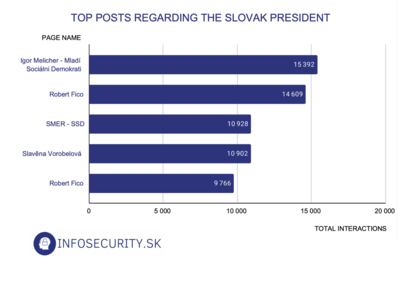Disinformation
Pro-Russian actors disinform about radiation in Slovakia , attacks against the Slovak President intensify

Infosecurity.sk presents an overview of disinformation trends that have been on the rise in information space in the past two weeks:
- The explosion of an ammunition depot in Ukraine is being used as part of Kremlin propaganda, the aim of which is to frighten the states supporting Ukraine and thus sow doubts about the continued international aid.
- Anti-western narratives regarding the war in Ukraine have been steadily on the rise in the Slovak information space, including accusations of warmongering and deliberate prolonging of the conflict. Disinformers utilized Putin’s public speech in order to validate their claims.
- The hateful rhetoric against Slovak president Zuzana Čaputová reaches an all-time high. The most widespread narratives include claims of foreign influence and some disinformation actors even use expressive language to prove their point.
Explosion in Khmelnytskyi as a talking point of Russian propaganda
Various attacks and false narratives about Ukraine have been spreading since the beginning of the Russian aggression in the country. Disinformation actors use practically every opportunity that presents itself to turn the public against Ukraine and thus reduce support for the war-torn country.
One of the most recent events that became a focal point of pro-Kremlin propaganda was the explosion of an ammunition depot in the town of Khmelnytskyi as a result of the Russian bombing. According to false reports, there was a radiation leak, as supposedly evidenced by the allegedly elevated levels of radiation in the area. Pro-Russian disinformers even claim that higher numbers were also recorded in Slovakia.
One of the main sources which have promoted this false narrative is the disinformation site Badatel, which is notorious for spreading dangerous conspiracy theories. The page has published several Facebook posts on the topic, with one comparing the explosion to the Chernobyl disaster in 1986, which represents an illogical and highly insensitive connection. In another post, Badatel even blames the Slovak government for “being silent” about the incident, insinuating that it poses a danger to the Slovak citizens.
Pavol Slota, the chairman of the nationalist Domov party, posted a video on his Facebook page, in which he calls on the Slovak authorities to provide more information about the incident. In the video, he proceeds to act as if he is only asking questions in order not to give the first impression of being a disinformation creator.
Claims about the high and allegedly dangerous levels of radiation have since been refuted by the responsible Slovak authorities such as the Office of Public Health of the Slovak Republic or Slovak Hydrometeorological Institute. According to the Slovak Police forces, this information operation aims to frighten the states supporting Ukraine and question the continued international aid. The narrative thus fits into the broader framework of Russian propaganda, which portrays support for Ukraine as a threat to the states' own interests while threatening possible retaliation.
The hoaxers only seem to mention and criticise Ukraine in connection with the incident, ignoring the fact that even if the radiation did indeed spread as a result of the explosion, it is a direct consequence of the Russian bombing and, therefore, of Russian aggression in the country.
Putin’s speech is being praised by disinformation actors
In the last two weeks, we have observed a rise in anti-Western and pro-Russian narratives, largely designed to justify Russian aggression and also to discredit Western efforts to resolve the conflict. However, the main narratives remain the same: the West is supposedly dragging Slovakia into the war and is not interested in a peaceful resolution of the conflict.
Andrej Danko, chairman of the nationalist SNS party (Slovak National Party), posted a video on his Facebook page, in which he states that the Western countries are slowly and subtly dragging Slovakia into the war in Ukraine. He goes on to accuse the “great powers” of purposefully prolonging the conflict to benefit themselves. Furthermore, he accuses the incumbent Slovak government of serving foreign interests. In another post, he goes as far as to say that if the USA had a different president, the war in Ukraine would already be over. All of the aforementioned claims can be seen as nothing more than mere conspiracy theories, since Danko, nor any other actor pushing the same narratives, has ever provided substantial evidence to support them.
These and other anti-Western narratives have also been further propagated by sharing Putin's Red Square speech, which is intended to lend some form of authority and credibility to anti-Western statements. The disinformation site Armáda Ruskej Federácie (Army of the Russian Federation) made a summary of the main points of the speech which reads: “The West provokes conflict and upheaval, destroys traditional values in order to continue to dictate its rules, and is essentially a system of robbery and violence… The goal of Russia's adversaries is to bring about the disintegration and destruction of our country.” The speech has also been shared by another disinformation site InfoVojna (InfoWar).
The main purpose of such statements is to portray the West as an aggressor that is dragging the whole world into war and is not a suitable partner for negotiating peace because it is inherently belligerent. In the case of Putin, these statements are expected; in the case of Slovakia, they simply confirm the fact that Russian propaganda is widely disseminated in the democratic states of the West precisely through local actors.
These kinds of tactics to divert attention from the initial Russian aggression are nothing new in the Slovak disinformation space and are frequently used by pro-Kremlin propagandists to justify the indefensible nature of the actions of the Russian Federation in Ukraine.
Personal attacks against the Slovak president Zuzana Čaputová reach an all-time high
Slovak President Zuzana Čaputová has been one of the main targets of hate speech and disinformation in the Slovak information space practically since her inauguration. These personal attacks directed at her have intensified exponentially after the Russian invasion of Ukraine when she openly began to show support for Slovakia's neighbour and condemn the actions of the Russian aggressor.
Now, the hostile rhetoric against her is the most widespread it has ever been, with both politicians and disinformation sites attacking her. Most of the false claims about the President are built on the unsubstantiated notion that she serves foreign interests.
Slavěna Vorobelova, MP (far-right Kotlebovci-ĽSNS, party) who often spreads pro-Russian disinformation, wrote in a post that “Čaputová is not the president of all citizens of the Slovak Republic, but she is the president of her affiliated political parties and NGOs mostly financed by foreign powers (mainly pro-American and pro-Soros ones),” subtly insinuating the false information that the president is controlled by some foreign influences.
The same narrative was also pushed by dubious political commentator Eduard Chmelár who stated that “Zuzana Čaputová's submissiveness to US interests (often at the expense of the state interests of the Slovak Republic) is highly extraordinary and can be proven.” Nevertheless, actors spreading this false notion are yet to provide any substantial evidence for their claims.
The rhetoric surrounding Zuzana Čaputová in the Slovak information space is at times highly hostile, as the example of the disinformer Ľuboš Hrica shows. In a video posted on his Facebook page, he calls the President “an American agent” and “an ecoterrorist” and accuses her of manipulating the Slovak public with “stupid reflections”. This only confirms the fact that disinformers have no problem using explicit language to promote their fabricated narratives, even against the head of state.
Since attacks against Slovak president Zuzana Čaputová have been prevalent in Slovak information space in the past two weeks, we also looked at them through an optic of a list of disinformation actors in Slovakia. We used the CrowdTangle analysis tool to analyse the most popular posts on Slovak Facebook that include the keyword “Čaputová“. Posts were evaluated based on the total number of interactions (the sum of all reactions, comments, and shares).

The first post belongs to a member of the SMER-SSD party and the Young Social Democrats (organization functioning under SMER-SSD), Igor Melicher. While proceeding to repeat the same narratives about the President being influenced and sponsored by foreign entities, he also says that the attacks against her are the consequence of her policy-making, which is, allegedly, “anti-Slovak and anti-democratic”. This claim is highly dangerous since it tries to justify hateful rhetoric against a state representative based on nothing more than a subjective political opinion and false accusations.
The second place belongs to Robert Fico, the chairman of an anti-system SMER-SSD party, who has been verbally harassing the President for a considerable period of time. In a post, he says that “Mrs Čaputová represents other interests than those of the Slovak Republic” and suggests that her emotional reaction to the harassment is exaggerated, which is supposed to excuse and to some extent justify the harmful comments he has made about her.
The official page of the SMER-SSD party posted a letter written by a party member Ľuboš Blaha addressed to the President. In it, in addition to the claims about her alleged political ties to the USA, he also writes the following: “If you are not mentally prepared for harsh criticism, so be it, no one is forcing you to stay in your post and take controversial decisions.” It is important to state, however, that these types of attacks are not only directed at her personally, but also at her close family. This is not so much on the part of the politicians, but rather their electorate, which they motivate to engage in this overall hateful rhetoric. Consequently, this type of harmful behaviour greatly contributes to the dehumanisation and toxicity of the public debate, which then leads to even greater polarisation and hatred in society.
The fourth place belongs to the aforementioned post by Slavěna Vorobelová, in which the MP insinuates that the President serves foreign interests and is sponsored by pro-American NGOs without providing any evidence for her accusations.
Lastly, Robert Fico pushed the identical narrative claiming that “Čaputová is the president of foreign interests” while trying to question the autonomy of her political decisions, which is intended to undermine public confidence in her political abilities. Fico has been selectively engaging in political conflict with a number of incumbent political representatives in recent months in order to target people who are dissatisfied with the present administration in order to score political points ahead of the upcoming elections.
Project Infosecurity.sk organized by Adapt Institute, which is supported by the Prague office of the Friedrich Naumann Foundation for Freedom, continuously monitors the activities of both Slovak and foreign disinformation actors, but focuses mainly on the former. The project activities are built upon daily monitoring of emerging disinformation, hoaxes, and conspiracy theories in the online information space. This approach allows the analysts to identify disinformation posts and narratives that resonated with the public the most, as well as to find out where they originated, and how they spread and evolved on social media. The report takes the form of a bi-weekly summary of arising trends in the spread of malicious information content online. Based on that, Infosecurity.sk can warn the public about emerging and current trends in the field of disinformation, manipulation, and propaganda.

